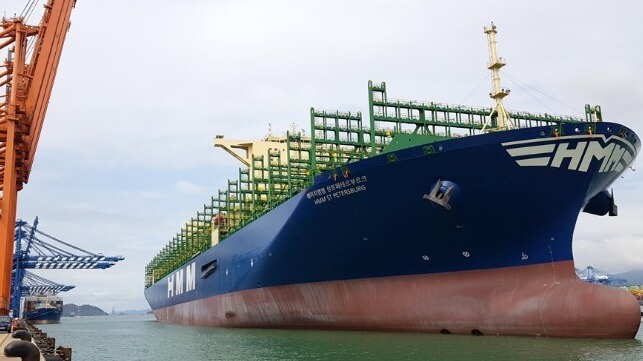Report: Hapag-Lloyd is Excluded from Second Round Bidding for HMM

Hapag-Lloyd according to reports in the Korean media will be excluded from the second round of bidding in the privatization of South Korea’s largest carrier HMM. Quoting unnamed investment bankers, South Korea’s state-run banks which are the selling shareholders reportedly will limit the competition to three Korean companies and still expect to select a buyer before the end of 2023.
Since formalizing the process for the sale of at least 40 percent of the shares of HMM, the Korea Development Bank and Korea Ocean Business Company were believed to favor one of the large Korean conglomerates as the buyer. The banks are reported to be considering the contributions the buyer could make to the industry and Korea in addition to the financial strength of the bids. Before they launched the tender the two banks had been quoted in the Korean media as saying HMM required management and continued investments to maintain the turnaround and build its leadership position. After having provided the financial rescue of the former Hyundai Merchant Marine, which became HMM in 2021, they said further investments should come from the private sector.
The two banks are offering 40 percent of the stock after converting a portion of their bonds which has driven the minimum value for the sale to a projected $3.7 billion. The banks also raised the possibility of converting additional bonds to raise the sale to 58 percent or a valuation of $4.5 billion. In the first-round documents, they said the terms would be discussed with the selected buyer and structured in such a way as to reduce the negative impact on the market valuation of HMM. The banks would continue to hold a smaller amount of convertible bonds but it is believed that they would look to sell them at a later date.
Reports in the Korean media were that the banks were disappointed that none of the largest Korean conglomerates chose to enter the bidding. In addition, SM Group had declared its interest in a deal valued at $3 billion and followed through on earlier statements not entering the bidding when the larger deal was proposed.
Hapag-Lloyd reportedly understood that its bid was a long shot based on the banks’ desire to keep control within Korea. Some reports however suggested that one of the Korean bidders might look to align with Hapag to make a joint bid.
As word leaked that the banks were likely to exclude Hapag from the bidding, a group of minority shareholders expressed support for the German company. They accused the banks of undermining the shareholder value of HMM by excluding Hapag. They noted that the bank’s declared objective was to maximize the value for Korean taxpayers and use the monies raised for investments in the Korean economy. They also cited the value of having an experienced shipping company as HMM’s lead investor.
Two Korean shipping organizations, the Federation of Korean Maritime Industries and the Busan Port Development Association, however, came out opposed to selling the shares to Hapag or a foreign buyer. They called HMM a national asset and expressed concerns about losing accumulated experience and called an overseas sale a “serious threat to national security.”
Media reports are saying that the investment bankers feared Hapag would use the due diligence to gain critical competitive information. They also said that Hapag had the financial strength to overpay for HMM driving the other companies from the tender.

that matters most
Get the latest maritime news delivered to your inbox daily.
One of the concerns raised is that the three Korean bidders, Harim, Dongwong, and LX Holdings, each lack the financial strength and capital for the bids. Reports however are that the three each indicated a willingness to pay the $3.7 billion expected minimum price. Harim has already formed a partnership for a joint bid with a private equity firm, while the other two companies are reportedly forming alliances to use equity capital, the banks, and debt financing.
The selling shareholders were expected to inform the companies by today of the next steps in the process. The qualified bidders are to begin due diligence lasting up to two months before entering their final bids. The goal is to complete a sale contract before the end of the year.
